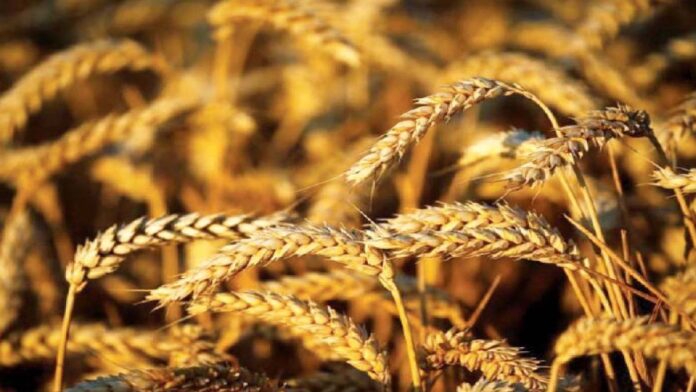ISLAMABAD: The Economic Coordination Committee (ECC) of the Cabinet on Thursday increased the wheat support price by nearly 13% to Rs2,200 per 40 kilograms for the new crop and allowed nearly Rs79 billion more subsidies to farmers and to partially clear the circular debt.
The ECC, which held its fourth meeting in 12 days, took some policy decisions amid deepening political uncertainty in the country. During the ECC meeting, the government admitted that output of the Kharif crops would plunge due to high cost of fertilisers in the country.
This contradicted the claim of Industries Minister Makhdoom Khusro Bakhtyar. Earlier, the Industries Ministry had claimed in a cabinet meeting that there was no issue of fertiliser price hike and that the commodity was available in abundance.
Finance Minister Shaukat Tarin presided over the ECC meeting. Since March 7, Tarin had taken decisions that have fiscal implications of Rs782 billion, including Rs407 billion to be funded from the budget. On March 7, the ECC approved Rs303 billion additional budget to offset the cost of fuel and electricity. The latest ECC, taken on Thursday, would cost Rs455 billion, including Rs79 billion hit on the budget.
Read also: Foreign investment slides 33pc in February
The ECC fixed the wheat support price at Rs2,200 per 40 kgs for procuring 6.9 million metric tons of wheat, according to a statement issued by the Ministry of Finance. It also allowed the provinces and the federal wheat procurement agency to take Rs375.7 billion loan from banks to buy wheat from farmers.
The wheat support price for the last season was Rs1,950 per 40 kgs but Sindh and Balochistan had already increased the price to Rs2,200, leaving no option for the federal government but to follow suit.
The ECC approved wheat procurement target of 1.4 million metric tons for Sindh along with cash credit limit of Rs77 billion and 100,000 metric tons target for Balochistan, along with a borrowing limit of Rs6.2 billion, according to the Finance Ministry.
The ECC approved 4 million metric tons wheat procurement target for Punjab and allowed it to borrow Rs220 billion, while Khyber Pakhtunkhwa was allowed to procure 200,000 metric tonnes from the Punjab Food Department with its own financial arrangements.
The ECC approved Rs72.5 billion borrowing plan for the Pakistan Agricultural Storage & Services Corporation (Passco) to help it buy 1.2 million metric tons of wheat.
According to various studies, a 10% increase in the wheat support price causes 3% increase in overall inflation rate. But there has always been a debate to strike a balance between the interests of the farmers and the urban consumers.
The wheat prices are already going up in Pakistan. The average wheat price increased to Rs63.3 per kg as of mid-February. The average per 40 kgs price was already Rs2,532, according to the Food Security Ministry.
The federal government had requested the provinces to submit their endorsement of the minimum support price and public wheat procurement targets with borrowing requirements. However, the governments of Sindh and Balochistan had unilaterally revised prices to Rs2,200 per 40 kgs.
The Food Security Ministry submitted a summary for extending the date of subsidy disbursement among the farmers of Kharif crop during 2021 on fertilizer (DAP), cotton seed and whitefly related pesticides.
The federal government has already released Rs4.5 billion to Sindh and Balochistan for the subject scheme. The ECC after discussion approved the proposal of subsidy disbursement till June 30, 2022 without additional monetary hit.
The Ministry of National Food Security and Research submitted another summary on subsidy to the farmers on fertiliser for Kharif Crops 2022. The ECC approved the subsidy disbursement in Kharif season 2022 amounting to Rs24.3 billion through provinces using their existing mechanism on equal cost-sharing basis for phosphatic fertilizers along with direction to strengthen the tracking system.
The federal government’s share would be Rs12.13 billion. Out of Rs24.3 billion, the subsidy requirement for farmers in Punjab is estimated at Rs17.3 billion, in Sindh Rs5.2 billion and rest of the amount would go in K-P and Balochistan.
Pakistan meets around 84% of its fertiliser requirement through local production while the rest is met through imports.
According to preliminary estimates of wheat crop 2021-22, released by the Punjab and Balochistan, Crop Reporting Services Centre (CRS) Area of Wheat Crop showed a decline. The production of other Rabi crops are also about to decrease by 7-10% due to low offtake of fertilisers as the prices were at extremely high side and high price of cost of production, according to the Food Ministry.
The ECC also approved Supplementary Grant of Rs50 billion to the Power Division to clear the IPPs dues. The ECC also approved Rs4.5 billion in favor of Ministry of Commerce for the Export Development Fund (EDF).

